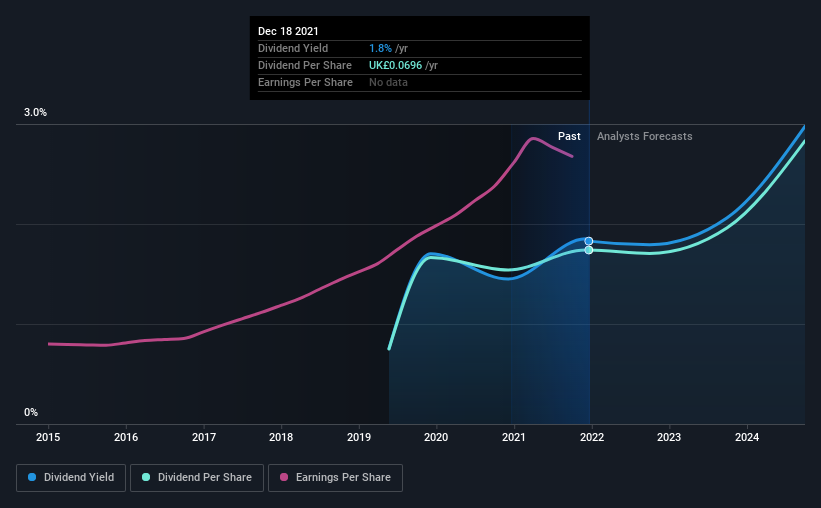
AJ Bell plc (LON:AJB) has announced that it will be increasing its dividend on the 4th of February to UK£0.095, which will be 104% higher than last year. This makes the dividend yield about the same as the industry average at 3.1%.
Check out our latest analysis for AJ Bell
AJ Bell Doesn't Earn Enough To Cover Its Payments
While it is always good to see a solid dividend yield, we should also consider whether the payment is feasible. The last dividend was quite easily covered by AJ Bell's earnings. This indicates that quite a large proportion of earnings is being invested back into the business.
Looking forward, earnings per share is forecast to fall by 2.8% over the next year. If the dividend continues along recent trends, we estimate the payout ratio could reach 135%, which could put the dividend in jeopardy if the company's earnings don't improve.

AJ Bell Is Still Building Its Track Record
The dividend hasn't seen any major cuts in the past, but the company has only been paying a dividend for 3 years, which isn't that long in the grand scheme of things. Since 2018, the dividend has gone from UK£0.03 to UK£0.07. This works out to be a compound annual growth rate (CAGR) of approximately 32% a year over that time. AJ Bell has been growing its dividend quite rapidly, which is exciting. However, the short payment history makes us question whether this performance will persist across a full market cycle.
The Dividend Looks Likely To Grow
The company's investors will be pleased to have been receiving dividend income for some time. It's encouraging to see AJ Bell has been growing its earnings per share at 26% a year over the past five years. The company doesn't have any problems growing, despite returning a lot of capital to shareholders, which is a very nice combination for a dividend stock to have.
We Really Like AJ Bell's Dividend
In summary, it is always positive to see the dividend being increased, and we are particularly pleased with its overall sustainability. The earnings easily cover the company's distributions, and the company is generating plenty of cash. We should point out that the earnings are expected to fall over the next 12 months, which won't be a problem if this doesn't become a trend, but could cause some turbulence in the next year. Taking this all into consideration, this looks like it could be a good dividend opportunity.
It's important to note that companies having a consistent dividend policy will generate greater investor confidence than those having an erratic one. Meanwhile, despite the importance of dividend payments, they are not the only factors our readers should know when assessing a company. As an example, we've identified 1 warning sign for AJ Bell that you should be aware of before investing. If you are a dividend investor, you might also want to look at our curated list of high performing dividend stock.
New: Manage All Your Stock Portfolios in One Place
We've created the ultimate portfolio companion for stock investors, and it's free.
• Connect an unlimited number of Portfolios and see your total in one currency
• Be alerted to new Warning Signs or Risks via email or mobile
• Track the Fair Value of your stocks
Have feedback on this article? Concerned about the content? Get in touch with us directly. Alternatively, email editorial-team (at) simplywallst.com.
This article by Simply Wall St is general in nature. We provide commentary based on historical data and analyst forecasts only using an unbiased methodology and our articles are not intended to be financial advice. It does not constitute a recommendation to buy or sell any stock, and does not take account of your objectives, or your financial situation. We aim to bring you long-term focused analysis driven by fundamental data. Note that our analysis may not factor in the latest price-sensitive company announcements or qualitative material. Simply Wall St has no position in any stocks mentioned.
About LSE:AJB
AJ Bell
Through its subsidiaries, operates investment platforms in the United Kingdom.
Flawless balance sheet with solid track record.
Similar Companies
Market Insights
Community Narratives



